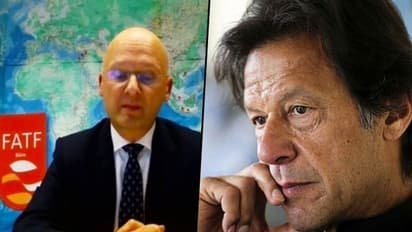Blow for Imran Khan as Pakistan remains on FATF greylist

Synopsis
Targeting Islamabad for addressing only 21 out of the 27 action items, FATF President Marcus Pleyer said the 6 action items that remain outstanding for Pakistan are serious deficiencies.
World's top anti-terrorism monitoring group -- the Financial Action Task Force -- on Friday voted to keep Pakistan on a grey list after the Imran Khan government failed to fully comply with a 27-point action plan handed to it.
Targeting Islamabad for addressing only 21 out of the 27 action items, FATF President Marcus Pleyer said the 6 action items that remain outstanding for Pakistan are serious deficiencies.
Pleyer said, "If Pakistan completes its 27 point action plan, there will be an on-site visit by the FATF team and a decision will be made whether to remove them from grey list."
"The Plenary recognises that Pakistan has made progress. But it is clear that it needs do more," he added.
The Paris-based global money laundering and terrorist financing watchdog had placed Pakistan on the grey list in June 2018 and asked Islamabad to implement a plan of action to curb money laundering and terror financing by the end of 2019 but the deadline was extended later on due to COVID-19 pandemic
Seeking to wriggle out of the FATF's grey list, debt-ridden Pakistan in August imposed financial sanctions on 88 banned terror groups and their leaders, including 26/11 Mumbai attack mastermind and Jamaat-ud-Dawa (JuD) chief Hafiz Saeed, Jaish-e-Mohammed (JeM) chief Masood Azhar and underworld don Dawood Ibrahim
With Pakistan's continuation in the 'grey list', it is increasingly becoming difficult for the country to get financial aid from the International Monetary Fund (IMF), World Bank, Asian Development Bank (ADB) and the European Union, thus further enhancing problems for the nation which is in a precarious financial situation
Check the Breaking News Today and Latest News from across India and around the world. Stay updated with the latest World News and global developments from politics to economy and current affairs. Get in-depth coverage of China News, Europe News, Pakistan News, and South Asia News, along with top headlines from the UK and US. Follow expert analysis, international trends, and breaking updates from around the globe. Download the Asianet News Official App from the Android Play Store and iPhone App Store for accurate and timely news updates anytime, anywhere.